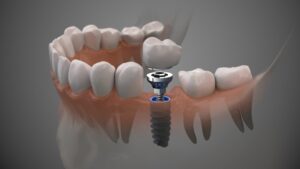
Dental implants are one of the most reliable and long-lasting tooth replacement solutions available today. With a success rate of around 95 percent, they give patients confidence in their smile and restore normal chewing function. However, like any medical or dental procedure, complications can occasionally occur. Recognizing the early signs of dental implant failure is crucial because prompt treatment can often save the implant and prevent further issues.
Types of Dental Implant Failure
Dental implant failure can happen in two ways:
- Early failure occurs within the first few months, usually due to poor healing or insufficient bone integration.
- Late failure happens after years of use and may be linked to gum disease, bone loss, or excessive stress on the implant.
Knowing what to watch for can help you seek care quickly.
Signs and Symptoms of Dental Implant Failure
Persistent Pain or Discomfort
Some soreness is normal after implant surgery, but pain should gradually subside as you heal. If you experience ongoing or worsening pain long after the healing period, it may indicate that the implant has not properly fused with the bone or there’s an infection.
Swelling, Redness, or Gum Inflammation
Healthy gums around an implant should look pink and firm. If you notice swelling, redness, or tenderness that doesn’t go away, it could be a sign of peri-implantitis, a type of gum infection that affects the tissues and bone supporting the implant.
Implant Mobility
One of the clearest signs of implant failure is looseness. A successful dental implant is firmly anchored in the jawbone and should feel as stable as a natural tooth. If your implant shifts, wiggles, or feels unstable when chewing, contact your dentist immediately.
Difficulty Chewing or Biting
Implants are designed to restore normal chewing function. If you begin to feel discomfort or notice changes when biting down, it may suggest the implant isn’t properly integrated with the bone.
Gum Recession Around the Implant
Receding gums around an implant can expose metal parts of the post, cause aesthetic concerns, and make the implant more vulnerable to infection or loosening. Gum changes are a red flag that should be checked promptly.
Signs of Infection
Infections may cause bad breath, pus around the implant, or an unpleasant taste in your mouth. Left untreated, an infection can spread and compromise both the implant and surrounding teeth.
What to Do If You Suspect Implant Failure
If you notice any of these symptoms, don’t wait—schedule an appointment with your dentist or implant specialist right away. Early intervention may involve deep cleaning, antibiotics, or bone grafting. In some cases, the implant may need to be removed and replaced after proper healing.
Dental implants are highly successful, but recognizing the signs of trouble early is key to protecting your smile. Persistent pain, gum inflammation, mobility, or difficulty chewing should never be ignored. With regular checkups, good oral hygiene, and quick action when something feels off, you can ensure your dental implants remain strong and functional for years to come.
About the Author
Dr. Sravanthi Kadiyala graduated with Summa Cum Laude honors from Nova Southeastern University School of Dental Medicine in Florida, where she earned her Doctor of Dental Surgery degree. She is an active member of multiple dental organizations, serves as a visiting faculty member at Nova Southeastern University School of Dental Medicine, and stays current with leading dental advancements and technologies via ongoing education. If you’re in the market for dental implants, schedule an appointment with us online or call our West Palm Beach office at (561) 686-2077.
